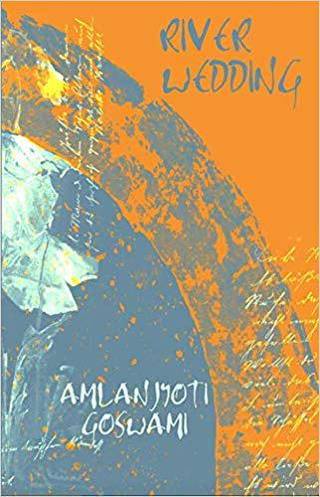The titular poem in Amlanyjoti Goswami’s River Wedding prepares us right away for the unexpected. The ‘wedding’ in question is not of a couple getting married outdoors, but of rivers themselves gathering in a great celebratory storm, at once spectacular and threatening.
Movement, whether of rivers or human beings, propels the collection forward. Journeys and travels, arrivals and departures, frequently serve as motifs. Images of airplanes, trains and terminals intersperse the pages of River Wedding, from the concrete aesthetic pieces such as ‘Terminal 3’ to intriguing juxtapositions in free verse, including ‘Reading Tibetan on the London Tube.’ Several affectionate pieces illustrate intergenerational family love, where elders share their caring wishes for younger family members, and, through them, journey through time as well as space.
Goswami’s work reflects a cosmopolitan awareness of a large world. Pieces take place in Indian cities and towns, a Caribbean beach, the London subway, and Washington, D.C. at night, where teens shoot hoops and those of all ages and backgrounds ride the bus home. In one piece, he highlights and laments the fear created internationally by racist violence in Charlottesville, Virginia, through a speaker who feels hunted even from miles away.
Yet he can write as evocatively about domestic scenes, as he does in ‘Two Sisters’ and ‘Lunch,’ as sensitively and directly as about his speakers’ meanderings or pensive abstract musings.
His language is conversational but never rambling or confessional, with a reserve that comes from intentionally chosen words. He brings in academic language when it adds to the subject and the flavor of a piece, when he talks of Matthew Arnold, ancient Tibetan books, or philosophy, yet never becomes abstruse for the sake of it.
He splashes in a dose of humor, in pieces such as ‘The Philosopher Meets his Match’ and plays with language and the arrangement of words on the page, as in ‘Leaving the Building’ and ‘Terminal 3.’
Yet, his greatest strength comes from the personal, affectionate poems, such as the tribute to the grandmother, ‘Aabu,’ written in her voice, which he can carry off with a gentle reserve that suggests deep feeling.
Amlanjyoti Goswami’s River Wedding is available here.

